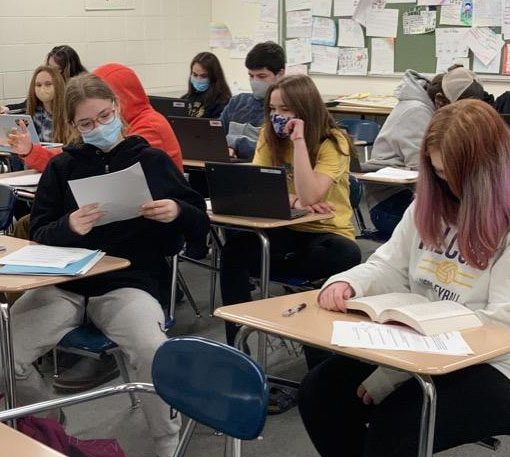Is talking about anxiety helping to reduce it, or is it just informing us how many people have been struggling in silence?
Anxiety comes into everyone’s life in vastly different ways. It can develop through stress or trauma, or just occur occasionally when you feel unable to reach a deadline. With so many different forms and occurrences of anxiety in life, it can be hard to understand the many different ways it can portray itself.
There are many types and variations of anxiety disorders, including agoraphobia, obsessive-compulsive disorder, general anxiety disorder, panic, separation and social. They can all start uniquely and cause avoidance, loneliness and fear associated with patterns/tendencies and or certain objects/places/ideas.
Agoraphobia is one of the more common disorders in school-age people. It associates places with anxiety, causing avoidance. School, home, hospitals and other places can cause everyday stress, which is normal, but when you are constantly concerned about going to or being in a place that causes anxiety mentally and/or physically, it will lead to an avoidance of the place altogether. You may feel too sick to go to school, show up for work or even not wanting to go home until you have to. Since COVID-19 started, locally there has been a rise in anxiety, whether it be because of the virus itself or another outside stress driver.
“It feels challenging to go to school every day. My stomach gets twisted in knots, and I simply would rather stay in bed all day,” a student shared.
Missing a day or two of school because you feel overwhelmed is something that happens occasionally, but when you start to notice your own avoidance of it, it may be time to reach out for help. It seems small to miss a day of school, but those patterns can grow into weekly rituals.
Even rituals can cause anxiety, which is identified as general anxiety disorder. Your routine, especially when starting a new one, can be full of stress. Coming back to school has triggered many questions. Do I have enough time to get this or that done? Why isn’t this going how I planned? How do other people have so many other activities in their day, and why can’t I? Those questions can provide useful information for yourself, but can also induce stress, anxiety and depression. You find yourself feeling overwhelmed or under-accomplished.
“Even before COVID, schools were seeing an increase in the amount of students struggling with mental health or anxiety issues,” EHS counselor Court Wirth said.
The things you do every day develop into the patterns of your life. It could show you how to be distracted all day or teach you how to confront your emotions and anxiety that can hide within them. Rituals are an easy thing to develop; they take over our days. People diagnosed with OCD are usually described as incredibly clean and tidy people. That is not always the case, though. Some people diagnosed with obsessive-compulsive disorder just do repetitive things such as touching something or tapping something for a certain amount of time in fear of someone getting hurt or even just because it feels as if they have to. Due to the differing severity levels of each individual, talk therapy and medication are the main methods used to manage it. That being said, just like all other types of anxiety, they all fluctuate depending on the day.
Panic disorders are one of the most common types of anxiety disorders. It can involve repeating episodes of panic attacks that come just as quickly as they can leave. A panic attack can be summed up as feeling like impending doom is just dancing around the corner of the next event. There are various methods to treat a panic disorder but not one single way can help in all cases. Some people prefer aromatherapy or talk therapy and even medication, including antidepressants or inhibitors, are effectively used in some cases.
“I have panic attacks regularly because so much of my self-validation relies on my grades,” a student said.
This happens more often than a person would think. Feeling unsuccessful in getting work done can stem from a lack of validation through other ways or experiencing pressure from respected adults to be the best of the best.
One saying goes, you can be a doctor who graduates at the top of the class with a 4.0 GPA, or you can get straight Cs and still become a doctor who gets paid the same. The rut of academic validation or validation from an outside source is mentally exhausting, but necessary when you are unable to do it for yourself. Work on it so you are able to validate yourself and your emotions independently for the future.
Pre-COVID, many people had issues that were not vocalized by the public but are being talked about more now. It’s also becoming more socially acceptable, but it can still be hard to ask for help. Many people find that part difficult, as if their issues are so insignificant that it’s pointless to reach out. It is worth it even if it’s over something you deem small because at the end of the day it’s still affecting you. Mental health is more important than pride.
Sources Used:
Anxiety Types; Mayo Clinic Staff; May 4th 2018
Anxiety disorders – Symptoms and causes
The Relationship Between Anxiety and Depression; Thomas Tjornehoj
The Relationship Between Anxiety and Depression
School Anxiety in the Classwork; Rachel Ehmke
School Anxiety in the Classroom
How Anxiety Affects Teenagers; Caroline Miller
Eugene Center for Anxiety and Stress | Mental Health Resources
Reach Out Options:
Talk to our councillors Court Wirth or Brittney McMillan
Email Brittney: bmcmillan@fernridge.k12.or.us
Email Court: cwirth@fernridge.k12.or.us





